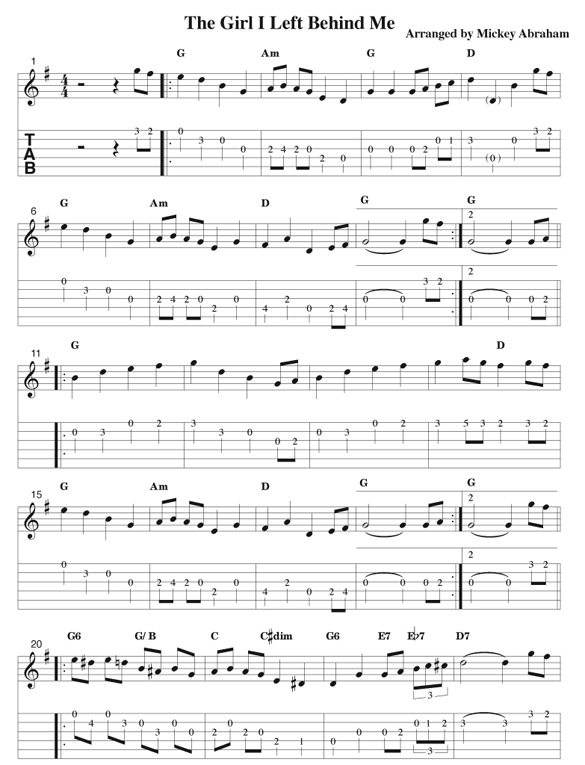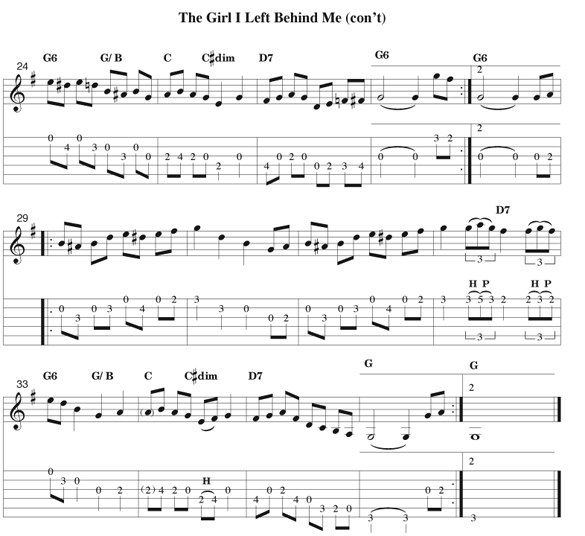|
August 2010 Free Flatpicking Lesson
from
Flatpicking Guitar Magazine
"The Girl I Left Behind Me"
Arranged by Mickey Abraham
Hello and welcome back to the most clicked on part of FGM’s
monthly newsletter, the free flatpicking lesson! Thanks for continuing
to use this on-line resource to explore new tunes and cool ideas. This
month I have arranged a great old-time tune called “The Girl I Left
Behind Me.” As usual, I have supplied two versions of the tune. First,
a basic melody, and then a more spiced up version that utilizes some
more intricate picking and some hip Texas-swing style back-up.
Let’s take a look at the
first version. This version of the tune is very straight forward and to
the point. I tried to express the tune’s memorable melody with as few
notes as possibleNeven for more advanced players, it is a good idea to
be able to express your favorite fiddle tunes with “easy” versions.
This way, you are certain that you understand the melody of a tune.
This also makes adding more advanced licks and ornamentations easier as
well as a more logical progression.
Next, even with the easy
stuff, remember to keep your right hand pick strokes correct! When
playing the first two pick-up notes in measure 1, you will be using
down-up picking (as you would for all connected eighth notes), but when
picking the second measure, you will be using four consecutive
downstrokes (as you would for all quarter notes that land on consecutive
downbeats). There are exceptions to every rule and I encourage you to
refer back to my free FGM lesson on pick stroke theory (click lessons
and tabs at the top of the flatpick.com page). Pick direction is one of
the things that can keep a beginner from playing in time and with a
good feel. Additionally, I pick this whole tune out of 2nd position
because the first fret never shows up. This position should feel nice
under your fingers and will avoid awkward pinky moves.
For the back-up, I feel
most folks use G, C, and D for the chords to this song, but I really
like the way the Am fits in. Every major chord has what musicians call a
relative minor that will often take the place of a major chord in a
progression. In this case, Am is the “relative” of C. Try playing a C
chord in the “A” section in place of where I have notated an Am chord.
They both work nice but, to me, the Am adds a little something.
Now let’s focus on
the second pass. One of my favorite sounds is playing one fret lower
than the notes in a chord before playing the notes in a chord. I know
this may sound confusing, but when you hear it, it makes perfect sense.
It is very similar to a funk player sliding into a funky chord, or a
bluegrass guitarist sliding into a big G chord. This concept can be
applied to lead playing. My lines in the variation are based on playing
notes of the chord that are a half step (one fret) below the “right”
notes. This is very common in fiddle tune variations and the
tension/resolution sound it creates clearly gives the lines a more
jazz/swingy vibe.
The chords are almost
Texas swing 101. To some, this is how the back-up to “Sally Goodin’” or
“Leather Britches” is supposed to go. You can apply these style chords
to almost any diatonic fiddle tune. Really, there is no right or
wrong, just more great ways to play great tunes! If you are an open
position chord player these chords will at first seem strange, but if
you can dedicate yourself to learning a few new chord shapes, you will
find a whole new world of music waiting for you to play. One technique
that is of great importance when playing swing style chords is to
remember to mute the strings that you are not playing. This is achieved
by different parts of your left hand skin resting against the strings
just enough so that they don’t ring. Use your finger tips to grab the
chords and the rest of your hand figuring out how to muffle the rest.
I hope you enjoy adding
this classic melody to your tune list and I hope you can find other
cool tunes to try these Texas style chords with. If you have and
questions, comments, or concerns on this e-lesson or any great ides for
future ideas you’d like to see featured here just drop me a line at
[email protected].


|